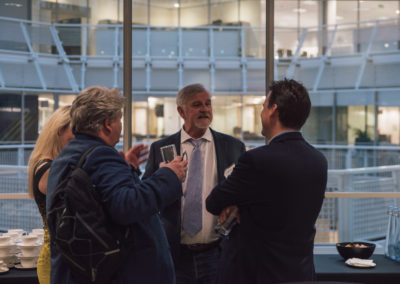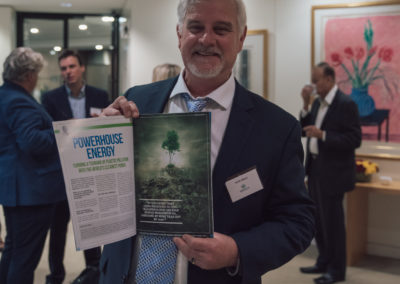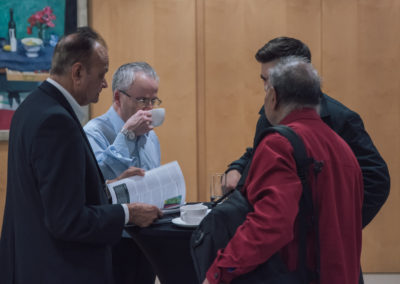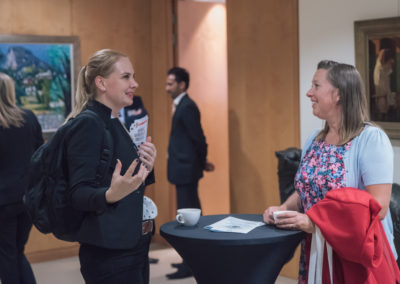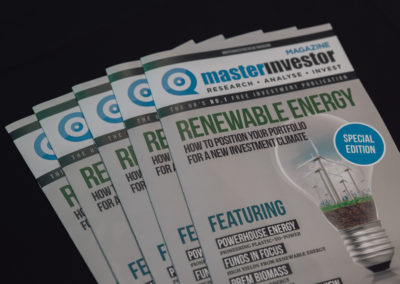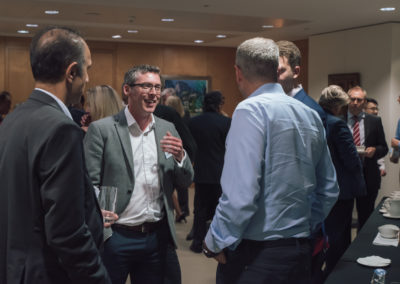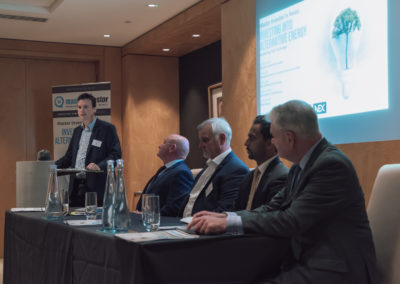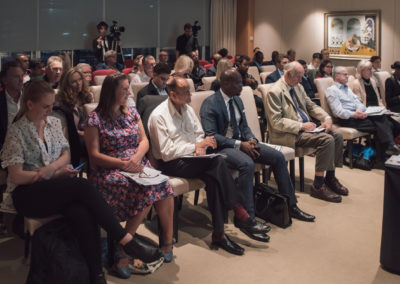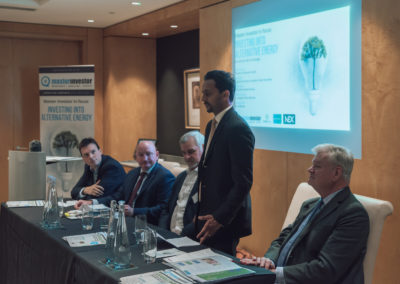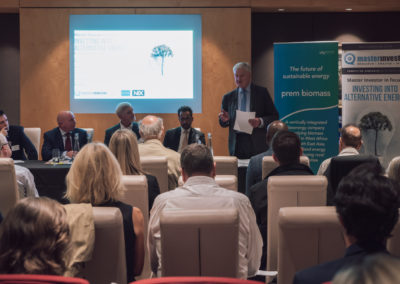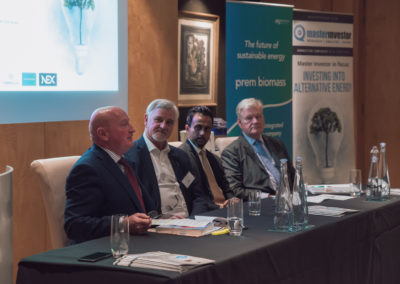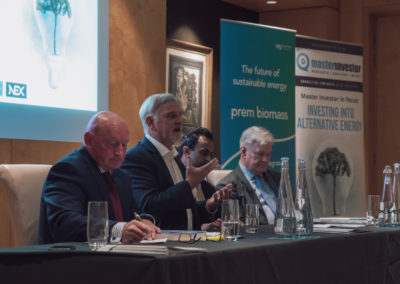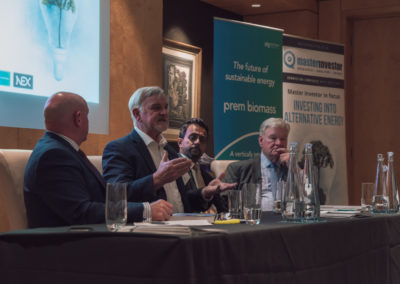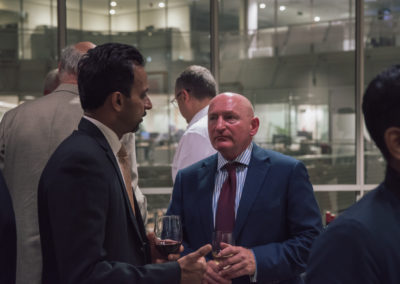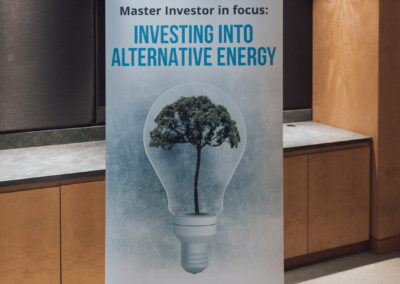Master Investor in focus:
INVESTING INTO ALTERNATIVE ENERGY11 October 2018, hosted by NEX Exchange, London
Video
Watch a full-length recording of the event.
Event review
Alternative energy is a broad field and our two guests, showcased that diversity: Prem Biomass, a start-up looking to generate power and returns with their plant technology in developing markets, and AIM-listed waste-to-energy specialist PowerHouse Energy (LON:PHE).
The Expert Panel
The panel segment of the event was moderated by David Scrivens, founder and director of Amberside Group, which consults on energy projects as well as providing consultancy, asset and fund management, and accounting services.
Prem Biomass aim to provide sustainable, low-cost biofuels for electricity generation while engaging in socially responsible development in its areas of operation. It works on a vertically integrated model that would combine growing napier grass and acacia trees for conversion into fuel pellets and modular power generation units that can support rural regions of Africa and South East Asia. Prem will be looking to raise £10 million in two tranches over the next year, with the initial tranche being in the region of £2 million. The company was represented at the event by co-founder Yatish Chouhan and board member Hartley Booth.
PowerHouse Energy is a specialist in developing and licensing technology to enable waste-to-energyconversion, specifically of non-recyclable waste plastics and end of use tyres into hydrogen and energy. The company’s process has been certified as feasible by DNV GL and the firm is in negotiation with a number of potential clients for the deployment of its proprietary process. Chief executive officer Keith Allaun spoke on the company’s behalf.
Regular readers of Master Investor will be familiar with Victor Hill. Victor is a financial economist, consultant, trainer and writer, with extensive experience in commercial and investment banking and fund management. His career includes stints at JP Morgan, Argyll Investment Management and World Bank IFC.
Discussion Summary
“You can’t have a company that is going to save the planet unless that company is sustainable, unless that company is providing returns to its investors.” – Keith Allaun
Alternative or renewable energy appears to be very much on trend in the energy world and, as Victor Hill pointed out during the discussion, one can hardly open a publication from an oil major without seeing a windmill on the cover. However, as was widely reported in the news recently, the UN Intergovernmental Panel on Climate Change suggests that we will need to go further than we have been in order to minimise risks. While this may require changes in the way we live and how our societies develop, it doesn’t mean that there won’t be opportunities to generate returns along the way.
One thing that all of our panellists agreed on was that there is no “silver bullet”, no single new technology or product that will solve all of the issues that we face. This is highlighted by the fact that while both of our featured firms generate power without the extraction of additional fossil fuels, they do so in very different ways. PowerHouse Energy has a “solution to waste plastic” that will allow it to deal with some of the 8 billion tonnes of waste plastic in the environment, including plastics that are not traditionally recyclable, while making an eco-synthesis gas, with a high proportion of very pure road quality hydrogen, that can be used to fuel vehicles, provide heating, and generate electricity. Prem Biomass has more in common with traditional primary industrial firms in its fuel production, but its social focus and distributed generation could provide a step change in living conditions for some of the seven million inhabitants of Ghana who currently have no access to electricity.
Mr Chouhan discussed Prem’s plans for the areas around its napier fields and said that it could offer a “rural revolution” broadening access to energy, while the company has also pledged to contribute to development in its local areas. Additionally, Mr Booth said that there were no food shortages or any forecast food shortages where Prem planned to operate so the removal of arable land from food production posed no risk to human conditions. If any unforeseen circumstances were to arise, Mr Booth said that the company was committed to ensuring that the local population are supported. On top of local generation, the company is looking to supply energy companies with pellets to fuel their biomass generators and the management team said that they would be able to be operational within four months of raising their initial £2 million funding tranche.
Another key point that achieved a degree of consensus was that the future of energy most likely rests in more distributed generation. While the traditional power plant may have its place within the energy ecosystem, both of the panel companies believed that producing energy close to where it is needed has huge benefits. Keith Allaun highlighted the difficulties, both logistical and economical, of transporting hydrogen gas and of the losses electricity incurs when transmitted over long distances but highlighted the benefits of setting up PowerHouse’s thermal conversion units where the eco-synthesis gas produced can be put to use. Meanwhile, Yatish Chouhan said that Prem Biomass’s modular power plants can be used in areas which currently lack the necessary infrastructure for traditional energy supply to be effective. And both companies’ processes are deployable now.
Mr Allaun said he believes industrial transport is one of the key industries for hydrogen fuel in the future. Today hydrogen is transported under pressure in tankers and is both expensive and very inefficient to move around. However, as he pointed out, . by setting up a PowerHouse thermal conversion unit at an industrial fleet’s home base, the need to move the fuel to where is is used is eliminated and the vehicles could also transport waste to the converter on their homeward tripsCritically, he added, that producing Hydrogen using PowerHouse’s process makes it economically viable as a fuel for vehicles putting it in terms of costs on a par with petrol and diesel.
There are, of course, potential problems and cautionary tales. Oil companies are still extracting vast amounts of oil and gas, and it can be difficult for alternative energy to compete on unit prices. Keith told the story about his old home of Gainesville in Florida which invested in a 102 MW biomass plant and had to purchase its way out of a 30-year power purchase agreement due to costs that were 40% higher than if they had retrofitted a coal plant to use natural gas. With fracking beginning in the UK, there could be similar problems with future projects if they are not correctly budgeted.
Overall, it was a positive night of discussion. Clearly, solving the current environmental crises will be a long and difficult process, particularly as new infrastructure is required and the world’s population continues to grow. However, everyone involved was confident that we have the technical solutions to many of the issues involved and that, as businesses and investors, it is possible to implement some of them to make both a positive difference and a profit.
Companies on the panel



SUBSCRIBE

